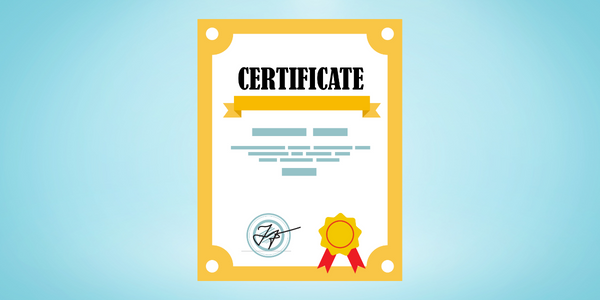Maintenance Certifications
What does maintenance certification entail?
Maintenance certification lends credibility to a maintenance professional’s qualifications. These programs generally involve examinations designed to test the professional’s working knowledge and skills. When earning their certification, maintenance workers prove their abilities against an objective set of criteria.
Some certifications include educational courses, in which case they provide training as well as evidence of the individual’s skill. Given that most maintenance positions only require minimal education, these programs can give professionals an extra edge in the workforce. By proving they have the training and skills they need to perform well in their profession, they are more likely to get hired and promoted.
For instance, a maintenance technician who has plenty of workplace experience and education may be well qualified, but someone who has “CMRT Certified” on their resume will stand out a bit more. This is because while another worker’s experience is extensive, their knowledge hasn’t necessarily been tested against current professional standards. That certification is evidence that the candidate is both well versed in their trade as well as committed to continuous improvement.
Certifications vary by industry, so it’s important for maintenance workers to seek out programs that are relevant to their specific trade.
Different popular certifications are detailed below.

General / Industrial maintenance certifications
- Certified Maintenance & Reliability Technician: The CMRT designation is offered by the Society for Maintenance & Reliability Professionals (SMRP). It tests core maintenance skills in four areas, namely maintenance practices, preventive and predictive maintenance, troubleshooting, and corrective maintenance.
- Certified Maintenance & Reliability Professional: Also offered by the SMRP, this certification focuses more on those who handle the managerial side of maintenance work. The skill sets tested include such items as work management, equipment reliability, and organization/leadership.
- IMI Certification: The International Maintenance Institute (IMI) offers certification for maintenance professionals throughout the industry. The program is testing-based, and they offer different levels of certification for professionals with varying levels of experience.
Facility maintenance certifications
- Certified Professional Maintenance Manager: Geared toward plant and facilities maintenance management, the CPMM designation is offered by the Association for Facilities Engineering (AFE). To be eligible to take the exam, candidates must either have two years of experience as a facilities maintenance supervisor or three years in the field in general.
- Facilities Management Certificate: The FMC program offered by Building Owners and Managers Institute International (BOMI International) includes courses that emphasize the efficient operation of industrial facilities.
- Building Systems Maintenance Certificate: Also offered by BOMI International, the SMC program trains facilities maintenance technicians on energy efficiency, HVAC, plumbing, and other building systems.
- Facility Management Professional: FMP certification, which is offered by the International Facility Management Association (IFMA), includes course materials on operations, maintenance, project management, finance, and leadership. Candidates complete the program with four final exams.
- Certified Facility Manager: Another credential offered by the IFMA, the CFM designation centers more on experiential competence rather than mastery of course materials. The final examination consists of 180 multiple choice questions covering various competency areas, including maintenance, human factors, communication, risk management, and sustainability.
Property maintenance certifications
- Certificate for Apartment Maintenance Technicians: The coursework offered by the National Apartment Association (NAA) prepares apartment maintenance technicians for a final exam, which they must take to obtain the certification. The exam tests a wide range of skill sets, including HVAC repair, mechanical services, painting, and professionalism.
- Certified Manager of Maintenance: This certification and training program is provided by the National Center for Housing Management (NCHM). Aimed at property maintenance managers and supervisors, the CMM designation is designed to train candidates in the various roles they need to play in their occupation.
City maintenance certifications
- Certified Public Works Professional: The American Public Works Association (APWA) offers a wide range of certifications, two of which fall under the CPWP designation: CPWP-S (for supervisors) and CPWP-M (for managers). Certification involves filling out an application and passing an exam.
Tips for seeking maintenance certification
When seeking maintenance certification, candidates need to make sure they meet the program’s minimum requirements. Some of the programs available offer coursework, while others are strictly test-based. Many of the above-mentioned programs require years of experience in the industry, so they are typically best for those who are already well established in their field.
Often, programs have specific testing dates. Others may take a while to schedule an exam, which means planning is vital for those seeking certification. Recertifying may also be required to keep one’s credentials current. In those cases, some organizations may have continuing education requirements to maintain certification.
While the preparation involved in maintenance certification may take time, it can help professionals land positions they might not qualify for otherwise, all while helping them adhere to best practices within their profession.


![[Review Badge] GetApp CMMS 2022 (Dark)](https://www.datocms-assets.com/38028/1673900459-get-app-logo-dark.png?auto=compress&fm=webp&w=347)
![[Review Badge] Gartner Peer Insights (Dark)](https://www.datocms-assets.com/38028/1673900494-gartner-logo-dark.png?auto=compress&fm=webp&w=336)
